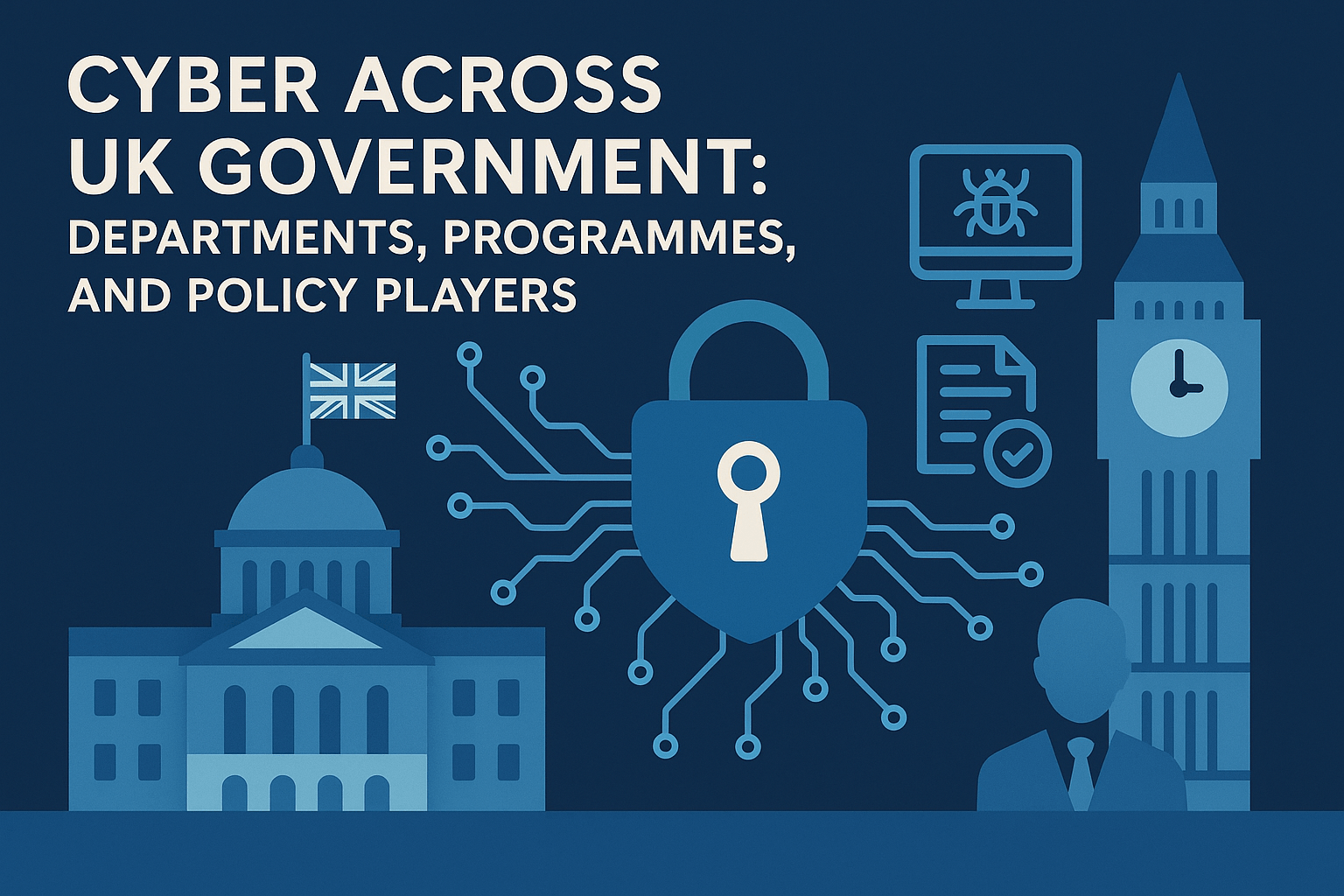The definitive guide to who shapes cyber policy in Whitehall, and how to work with them.
Influencing UK government thinking on cybersecurity means more than knowing your acronyms. It demands an understanding of the structures, funding flows, personalities, and priorities spread across departments. Unlike the US, the UK’s cyber governance is decentralised, policy is formed in one place, enforced in another, and often delivered through partnerships, arms-length bodies, and regional actors.
Whether you’re a founder navigating procurement, a policymaker seeking allies, or a professional trying to plug into national strategy, this article maps the key players shaping cyber across UK government, and how you can engage with them.
Contents
1. Strategic Policy Makers and Funders
These departments set national cyber strategy, control major funding, and steer programme design.
Department for Science, Innovation and Technology (DSIT)
- Role: Civilian lead for cyber policy and innovation
- Programmes: Cyber Runway, Cyber Local, Cyber Explorers, Secure Connected Places
- Why it matters: DSIT holds the purse strings for the majority of SME/startup cyber engagement and drives skills, innovation, and ecosystem growth.
Link: https://www.gov.uk/government/organisations/department-for-science-innovation-and-technology
Cabinet Office – Government Cyber Security Strategy Unit
- Role: Oversees public sector cybersecurity (especially central/local government)
- Programmes: GovAssure, central guidance for departments
- Why it matters: Responsible for ensuring government systems are resilient and compliant with national frameworks.
Link: https://www.gov.uk/government/publications/government-cyber-security-strategy-2022-to-2030
National Cyber Security Centre (NCSC) (part of GCHQ)
- Role: UK’s technical authority on cyber threats, guidance, and incident response
- Programmes: Industry 100, CyberFirst, Early Warning, assurance frameworks
- Why it matters: Sets the technical tone for the entire UK ecosystem. Guidance issued here is taken as best practice nationally.
Link: https://www.ncsc.gov.uk
Ministry of Defence (MoD)
- Role: Cyber operations, defence systems, military cyber capability
- Key Stakeholders: Defence Digital, Strategic Command
- Why it matters: Leads on offensive cyber and defence industrial base protection. Essential if you work in OT security, AI ethics, or secure comms.
Link: https://www.gov.uk/government/organisations/ministry-of-defence
Department for Business and Trade (DBT)
- Role: Cyber exports, global trade missions, foreign investment
- Why it matters: Helps promote UK cyber companies abroad. Key for those seeking international growth, foreign buyers, or export support.
Link: https://www.gov.uk/government/organisations/department-for-business-and-trade
2. Operational and Enforcement Bodies
These actors deliver cybersecurity capability on the ground, from law enforcement to tech procurement.
Home Office
- Role: Cybercrime, online harms, digital border control
- Key Units: Joint Fraud Taskforce, Online Safety Bill implementation teams
- Why it matters: Leads on legislation related to cybercrime, fraud, and digital safety.
National Crime Agency (NCA) & National Cyber Crime Unit (NCCU)
- Role: Investigating cybercrime, ransomware, and criminal infrastructure
- Why it matters: Major partner for private sector intelligence-sharing and threat disruption.
Link: https://www.nationalcrimeagency.gov.uk
Regional Organised Crime Units (ROCUs)
- Role: Regional enforcement of cybercrime laws
- Why it matters: ROCUs are increasingly open to engagement with local businesses, universities, and cyber resilience centres.
Link: https://www.rocu.police.uk/
Police Digital Service (PDS)
- Role: Modernising UK policing through technology
- Programmes: Cyber security capability across 43 police forces
- Why it matters: Manages national tech procurement and delivery for UK policing, including cyber infrastructure.
Link: https://www.policedigital.org/
3. Sector Regulators and Supervisors
These watchdogs ensure resilience and compliance in their sectors, often enforcing or referencing cyber best practice.
- Ofcom – telecoms and critical digital infrastructure
- FCA (Financial Conduct Authority) – cyber in finance and insurance
- Ofgem / Ofwat – utility resilience and incident reporting
- ICO (Information Commissioner’s Office) – data protection and breach response
- Health Security Agency / NHS England – cybersecurity in healthcare delivery
Working with these bodies, or aligning with their expectations, is key for selling into regulated markets.
4. Research, Innovation, and Skills Drivers
This is where policy meets practical delivery of cyber talent, R&D, and commercialisation.
Innovate UK / UKRI
- Programmes: CyberASAP, DSbD, AI research, Secure Digital
- Why it matters: Funds translational cyber research, including startup accelerators and academic spinouts.
Link: https://www.ukri.org
UK Cyber Security Council
- Role: Professional standards body for the UK cyber workforce
- Why it matters: Shapes the National Occupational Standards for cybersecurity roles and qualifications.
Link: https://www.ukcybersecuritycouncil.org.uk
CyberFirst (via NCSC)
- Target Audience: Students aged 11–21
- Why it matters: Leading national skills pipeline initiative; working with them aligns you to national talent development goals.
5. Engagement Pathways: How to Get Involved
Want to influence policy or participate in delivery? Start here:
- Apply to join:
- NCSC Industry 100
- UK Cyber Security Council working groups
- DSIT delivery partner programmes
- Speak up:
- Respond to open consultations (ICO, DSIT, Cabinet Office)
- Submit evidence to Select Committees and All-Party Parliamentary Groups (APPGs)
- Partner:
- Join Innovate UK collaborations
- Work with ROCUs and CRCs on regional resilience
- Co-author thought leadership with regulators and public bodies
- Procure:
- Register on government frameworks like G-Cloud or Digital Outcomes
- Partner with SIs or MSPs already delivering public contracts
Final Thoughts
The UK’s cyber policy and delivery landscape is complex but navigable. It rewards credibility, consistency, and contribution. By understanding who does what, from DSIT’s programme grants to NCSC’s technical guidance, you can better align your mission with national goals, and meaningfully influence the future of UK cybersecurity.
This is your map. Now go build your influence.
References
- Inside the UK Cyber Ecosystem: A Strategic Guide in 26 Parts
- The Insider’s Guide to Influencing Senior Tech and Cybersecurity Leaders in the UK
- Cyber Across UK Government: Departments, Programmes, and Policy Players
- UK Cyber Skills Landscape: The Real Gatekeepers of Talent and Training
- The Quiet Power Players of UK Cybersecurity: Who Really Shapes the Agenda?
